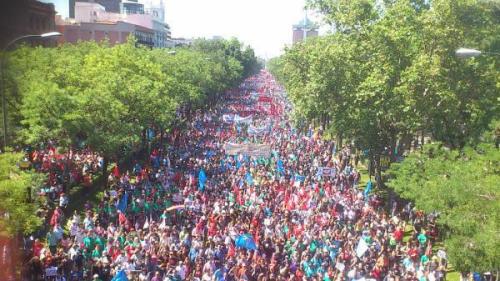FinChannel.com
16/07/2012 05:44
The FINANCIAL -- As Spain struggles with wage and budget cuts as part of sweeping austerity measures, Spaniards exasperated at seeing no end in sight are increasingly taking their grievances to the streets. |
Thousands of people came out into the streets of central Madrid on Sunday, just 48 hours after their last protest, sparked by the approval of Spain's latest austerity plan on Friday.
Sunday's late-night protest was spontaneous, sparked by calls on social networking sites, said 21-year-old fireman Miguel Rodriguez. It brought together professionals such as firemen and police along with civil servants who all opposed the government's plan.
Spaniards say they just despair of what is next.
"I can't see any future. We don't have work and they are taking our health and education systems away from us," said Maria Jimena, 25.
"We cannot tolerate all that they are doing, all these cuts. Civil servants, the jobless, we'll have to wait and see if retired people are next," said another protester Pedro Hernandez, a retired 67-year-old.
Spain's two main unions CCOO and UGT have called for another nationwide strike for Thursday over the latest round of trimming, which includes lower jobless benefits and public sector pay cuts.
A general rate increase in VAT is also sure to hit hard everywhere from tourism to fisheries, car show rooms and consumer associations.
As EUbusiness reporetd, while the plan will claw back 56.4 billion euros ($69 billion) for the state between now and 2014, Mariano Rajoy's government will still have to make up an 8.6-billion-euro shortfall to reach the 65 billion euros in cuts required by the European Union.
Press reports have suggested that this sum will come, at least in part, from a sharp rise in electricity bills for industry and households -- the final straw for a country where one in four people are now unemployed.
The cuts "are not a roadmap to saving Spain" but are instead driving the country deeper into recession, according to unions, who are not ruling out a general strike in September.
Strikes and protests have been a relative rarity in Spain in the years following the end of Francisco Franco's dictatorshop but painful deficit-cutting measures are making protests a more regular occurrence as people show their despair.
An "indignant" protest movement inspired by similar protests from Britain to the United States' Occupy Wall Street was born in early 2011 in a sprawling encampment at Madrid's central Puerta del Sol square.
What people see as the government "playing on the summer, on people's apathy, fear, tendency to resignation" could further outrage the population, warned Ignacio Fernandez Toxo of the CCOO union.
Toxo has proposed a referendum on the latest measures which he says would provide an alternative to "pure contention in the street, strikes and demonstrations."
Despite the growing resentment, unions say they are determined to keep protests peaceful after two lots of clashes between protesters and police in the Spanish capital last week led to a number of arrests and 23 light injuries.
Spain will this month become the fourth eurozone country, after Greece, Ireland and Portugal, to get bailout funds when it receives the first tranche of a 100-billion-euro kitty for its banking sector.
The bailout is likely to provoke further ire from Spaniards who feel their banks go unpunished while they are forced to tighten the purse strings on a daily basis.
Source: FinChannel.com

